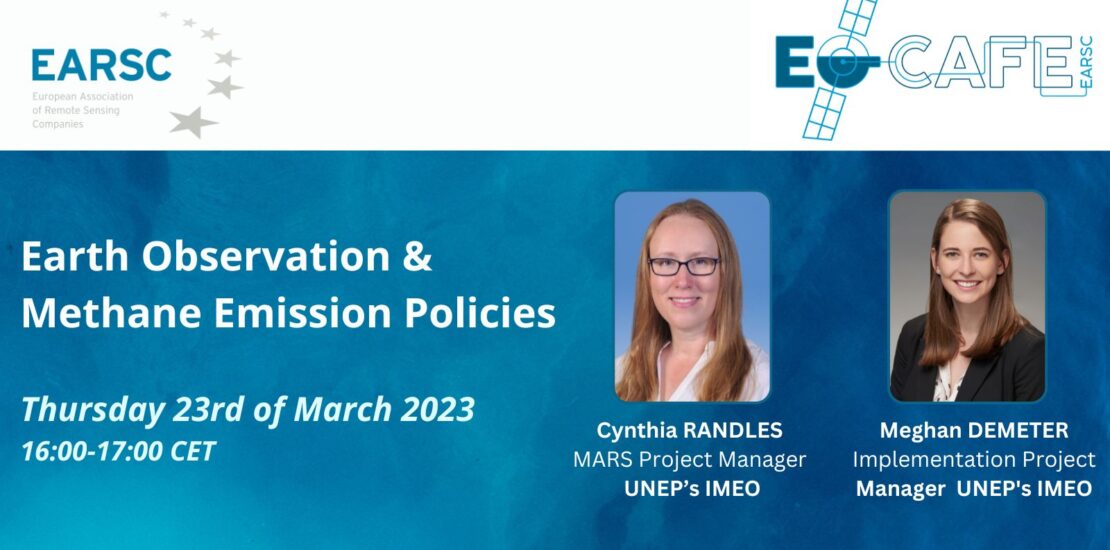- March 7, 2023
- Posted by: EARSC
- Categories: EARSC News, EOcafe

Earth Observation & Methane Emission Policies
Thursday, 23rd of March 2023
16:00-17:00 CET
Previously in the EOcafe, we have discussed the European Green Deal and some of the implications for the EO services sector. The European Climate Law requires that greenhouse gas (GHG) emissions[1] and removals are balanced within the European Union by at the latest 2050 with the objective to achieve negative emissions thereafter. In this EOcafe, we shall take a deeper dive and look at the efforts to reduce methane emissions and how this might create opportunities for the sector in the future.
Launched at the G20 Summit, the International Methane Emissions Observatory (IMEO) is a data-driven, action-focused initiative by the UN Environment Programme (UNEP) with support from the European Commission to catalyse the dramatic reduction of methane emissions. IMEO is set to revolutionize the approach to methane reduction by interconnecting data with action on research, reporting, and implementation. IMEO collects and integrates diverse methane emissions data streams to establish a global public record of empirically verified methane emissions at an unprecedented level of accuracy and granularity.
As part of these efforts, the UNEP announced during COP-27 in November last year IMEO’s new satellite-based system to detect emissions of the climate warming gas and allow governments and businesses to respond. In December 2022, the Council reached an agreement (general approach) on a proposal to track and reduce methane emissions in the energy sector. The text is the first of its kind and a crucial contribution to climate action, as methane is the second most important greenhouse gas following carbon dioxide. In the context of the UN 2030 Agenda and the European Green Deal, there is little doubt that the use of digital solutions is becoming increasingly important to meet the United Nations and the European Union’s climate targets. More specifically, remote sensing technologies have several advantages, such as large spatial coverage, allowing to provide a continuous and global view of the Earth’s parameters.
With the Working Group on the Green Deal [2], EARSC’s objective is to gather its member’s views and expertise on how the downstream Earth Observation sector can support the European Green Deal and provide operational solutions to contribute to the EU climate targets. The importance of raising awareness and better communicating on the EO capabilities will be paramount to support data-driven decision-making and policymakers. For this EOcafe dedicated to a specific item on the Green Deal’s agenda, let’s have a deeper look at the EU methane monitoring policies and understand how the EO Downstream services industry can contribute to the achievement of EU climate targets
Our host Geoff SAWYER (EARSC Strategic Advisor and former Secretary General) will discuss with Cynthia RANDLES (MARS Project Manager at UNEP’s IMEO) and Meghan DEMETER (Implementation Project Manager at UNEP’s IMEO).
The topics which will be addressed during this EOcafe include the following:
- The role of EO capabilities to support methane emission policies
- The recommendations of UNEP regarding methane emission strategies and policies
- The challenges and gaps identified by UNEP in the context of methane emission policies
- The integration of EO capabilities in the UN 2030 Agenda and the Green Deal related policies and legislations
- The contribution of commercial providers to the Methane Alert and Response System (MARS)
Registration: The webinar is free but registration is compulsory. Please click on the following link to register.
Please note this is a virtual event!
EOcafe is part of a series of EARSC meetings that offer timely, relevant, and practical information on a broad variety of topics related to the EO sector. Join us every two weeks to discuss and network while enjoying a cup of coffee with friends.
IMPORTANT NOTES!!!
- The use of a video camera is not mandatory but is encouraged to facilitate better interaction between the attendees and the guest speaker(s).
- The EOcafe will stay open after 17:00 in case our guests want to continue the discussion.
- By registering for this event, you accept the terms and conditions (https://earsc.org/wp-content/uploads/2021/03/EARSC_Events_GDPR.pdf).
If you have any questions, and/or you want to know more about the EOcafe, and/or you want to share an idea about a future EOcafe, please contact Natassa (natassa.antoniou@earsc.org).
[1] As announced in the European Green Deal, the Commission assessed the Union’s 2030 target for greenhouse gas emission reduction in its communication of 17 September 2020 entitled ‘Stepping up Europe’s 2030 climate ambition – Investing in a climate-neutral future for the benefit of our people.
[2] The EARSC Green Deal WG was established in December 2021.
